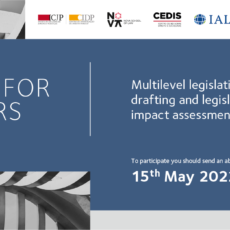
The journal Theory and Practice of Legislation will be publishing an emergency Special Issue on legislative responses to the Coronavirus.
Its aim is to offer an international and interdisciplinary forum for the examination of legislation. The journal addresses formal legislation and its alternatives, such as covenants, regulation by non-state actors, etc.
Papers should examine topics related to the overall legislative response to the Coronavirus. They can include but are not limited to the following issues:
- The definition of “emergency” which allows for emergency legislation
- Changes to normal law-making procedures for emergency legislation
- Responsibility of legislatures in these circumstances to either initiate or scrutinise legislative proposals
- Effectiveness of legislatures in holding governments to account
- Whether legislatures continue to sit and adaptions allowing them to sit
- Nature, form, and content of emergency legislation
- Clashes between public health protection and individual liberties
- Whether legislation is evidence-based or a political response to the circumstances
- Role of scientists / experts in law-making
- Procedural safeguards built into legislation: access to courts, scrutiny by parliaments, etc.
- Time limits for emergency legislation and procedures for extending it
- Curtailment of ordinary constitutional practice and the rule of law during emergencies
- Compliance of national legislation with international obligations under ICCPR and the Siracusa principles
- Fitness of existing domestic legislation to deal with emergencies or need for new legislation
- Co-ordination of responses within states (federal, regional, municipal, local) and across states (EU, UN, other international organisations)
- Differences in legislative responses for pandemics, war, terrorism, other natural disasters
Country-specific papers are within the scope of this call. In such cases, authors are expected to undertake a normative assessment beyond the description of the legislation. These assessments should be original analysis.
Abstracts and papers should be sent directly to the corresponding editors, Drs. Ronan Cormacain (ronancormacain@gmail.com) and Ittai Bar-Siman-Tov (Ittai.Bar-Siman-Tov@biu.ac.il).
Deadline for submission of abstracts is 6 April 2020.
Abstracts should include the provisional title and an outline of the proposed content. This should be a few hundred words long but there is no word limit.
Editors will carry out a preliminary sift of abstracts and invite authors to submit a full paper. Once invited, authors are expected to submit their papers as soon as possible. This will allow to maximise impact as they will be published online as soon as ready. Papers will be peer-reviewed and published approximately within two weeks after acceptance.
Deadline for submission of papers is 8 May 2020.
The usual paper length ranges from 6,000 to 8,000 words. Shorter submissions of, at least, 4,000 words will be exceptionally accepted in view of the circumstances.
Papers should follow the Style Guide OSCOLA (4th edition).
Read detailed instructions for authors here.
See the full call for papers here.
The publishers have announced that all COVID-19 related, peer-reviewed, research published in Taylor & Francis journals is free to access.





